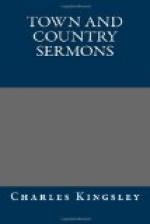I am not going to draw any far-fetched analogy between the miracle recorded in the gospel, and the subject on which I am speaking. I am not going to put any mystical and mediaeval interpretation on the seven loaves, or the two small fishes. I only ask you to accept the plain moral practical lesson which the words convey.—
Use the means which you have already, however few and weak they seem. If Christ be among you, as he is indeed, he will bless them, and multiply them you know not how.
Use the means which you have; though they may seem to you inadequate, though they may seem to the world antiquated, and decrepit, try them. They need not depart from us, these masses, to seek spiritual food, they know not where, if we have but faith. Let us give them what we have; the organization of the Church of England, and the teaching of the Church of England.
The organization of the Church. Not merely its Parochial system, but its Diocesan system. In London, more than in any part of England, the Diocesan system is valuable. A London parish is not like a country one, a self-dependent, corporate body, made up of residents of every rank, capable of providing for the physical and spiritual wants of its own stationary population. In London, population fluctuates rapidly, sometimes rolling away from one quarter, always developing itself in fresh quarters; in London all ranks do not dwell side by side within sight and sound of each other: but the rich and the poor, the employed and the unemployed, dwell apart, work apart, and are but too often out of sight, out of mind. These, and many other reasons, make it impossible for the mere parochial system to bring out the zeal and the liberality of London Churchmen. If they are to realize their unity and their strength, they must do so not as members of a Parish, but of a Diocese; their Bishop must be to them the sign that they are one body; their good works must be organized more and more under him, and round him. This is no new theory of mine; it is a historic law. The Priest for the village, the Bishop for the city, has been the natural and necessary organization of the Church in every age; and it was in strict accordance with this historic law, that the London Diocesan Board of Education was founded in 1846, not to override the parochial system, but to do for it what it cannot, in a great city, do for itself; to establish elementary schools (and now I am happy to say, evening schools also) in parishes which were too poor to furnish them for themselves. I, as the son of a London Rector, can bear my testimony to the excellent working of that Board; and it is with grief I hear that, in spite of the vast work which it has done since 1846, and which it is still doing, on an income which is now not 300 pounds a year—proving thereby how cheaply and easily your work may be done when it is done in the right way—it is with grief, I say, that I hear that it is more and more neglected by the religious public.




